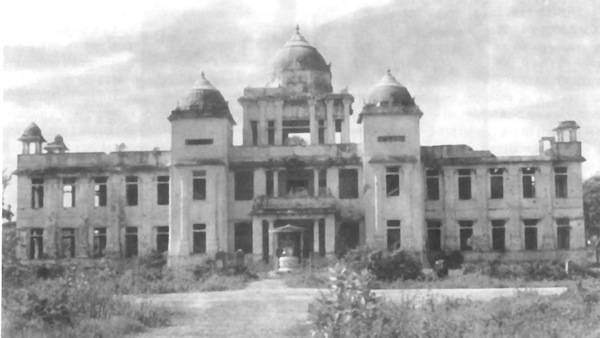
Image taken from Jaffna Photo Gallery
1st June marked the 30th anniversary of the burning of the Jaffna Public Library. An eye witness account was delivered at the International Centre for Ethnic Studies by Mr Silan Kadirgamar,former senior lecturer University of Jaffna, former President of Movement for Inter-Racial Justice and Equality, Jaffna branch and Founding member of Jaffna Citizen’s Committee(1981).
The speaker recounted the events that contributed to the heightening of ethnic tensions since Sri Lanka attained Independence in 1948 culminating in the fateful incident which he felt was a turning point in the ethnic conflict. His analysis of the event was primarily to remind society that they must ensure that such a crime should not recur as ‘those who forget the past are doomed to repeat it’.
Unfortunately, the limited few comments from the audience seemed to trivialize the subject by recounting details of the incident rather than discussing its substance. Others tried to offer dubious leads to the perpetrators of the crime. A commanding officer of the navy, present in the audience, indulged in ample self praise in his role in preventing the escalation of several acts of arson and violence committed in the town that fateful night prior to the DDC elections. He subsequently revealed his true feelings on the issue by claiming that, contrary to popular belief, the burning of the library was not such a great tragedy as it was not the most outstanding repository of Tamil culture. His obvious ignorance on the subject and arrogance to comment on it was deplorable. Another uninformed commentator stated that despite claims to the contrary, a commission of inquiry was appointed by the then government to investigate the crime and the government offered an apology as well which he implied was adequate. Obviously, the commission of inquiry was either incompetent in solving the crime or their report was swept under the carpet as the perpetrators were never brought to book.
Some one quite rightly pointed out that it was a crime against humanity. No doubt, it is a crime which struck at the very heart of Tamil culture and civilization- a crime which is tantamount to rape, as described by the speaker – a rape not of the body but of the hearts and minds – for this repository of knowledge, culture and history represented the pride and dignity of the Tamil people.
An ardent spokesperson on behalf of the incumbent government who was also present in the audience strongly condemned the act as preposterous. In view of his condemnation, it would have been apt to ask him whether he would advocate an international investigation into the crime as successive governments have failed to address it conclusively and provide the Tamils with, at least, a perceived sense of justice and accountability. Unfortunately, his presence was too intimidating to permit uninhibited and free debate.
It seems that we are destined to repeat history as we are, once again, being subject to allegations of war crimes against the Tamils during the final stages of the conflict. The government has chosen to challenge the UNSG as head of the most august and unbiased internationally representative body, in contesting the authenticity of the allegations instead of showing sincere concern to investigate such serious allegations which would be the most natural and correct thing to do if they were genuinely interested in ensuring post war reconciliation.
Are we a nation doomed? Not, if society has the courage to demand of our leadership rapid accountability and justice for all outstanding issues which are critical to establishing their commitment to good governance and ensuring peace and equity for all its citizens irrespective of their ethnicity and creed.